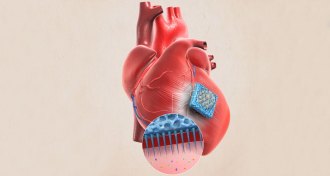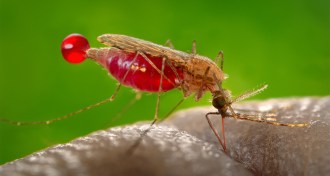Humans
Sign up for our newsletter
We summarize the week's scientific breakthroughs every Thursday.
-
 Health & Medicine
Health & MedicineIn a first, a woman with a uterus transplanted from a deceased donor gives birth
After receiving a uterus from a deceased donor, a woman gave birth to a healthy girl in December of 2017.
-
 Archaeology
ArchaeologyStone Age people conquered the Tibetan Plateau’s thin air
Stone tools that are at least 30,000 years old suggest that people settled the high-altitude Tibetan Plateau earlier than scientists thought.
By Bruce Bower -
 Health & Medicine
Health & MedicineAround the world, reported measles cases jumped 31 percent in 2017
While the number of reported measles cases has dropped 80 percent from 2000 to 2017, high profile outbreaks pushed the 2017 total up from 2016.
-
 Archaeology
ArchaeologyStone-tool makers reached North Africa and Arabia surprisingly early
Ancient Homo species spread advances in toolmaking far beyond East Africa.
By Bruce Bower -
 Health & Medicine
Health & MedicineKids born in August are diagnosed with ADHD more than kids born in September
August-born kids have higher rates of ADHD diagnosis than kids born in September in U.S. states with a September 1 cutoff for starting kindergarten.
-
 Health & Medicine
Health & MedicineA patch studded with tiny needles may help heart attack survivors recover
A bandage that sticks to the surface of the heart exudes proteins and other molecules that help muscle cells grow.
-
 Animals
AnimalsMosquitoes may surf winds above Africa more than we realized
More than 40 meters up, balloon traps in Mali caught females of malaria-spreading mosquito species.
By Susan Milius -
 Environment
EnvironmentEngineers are plugging holes in drinking water treatment
Drinking water quality has come a long way in the past hundred years — but challenges remain.
-
 Science & Society
Science & SocietyDo you know how your drinking water is treated?
Editor in Chief Nancy Shute discusses drinking water quality in the United States and the latest research on water treatment technology.
By Nancy Shute -
 Health & Medicine
Health & MedicineDon’t spank your kids. Do time-outs and positive talk instead, pediatricians say
A pediatrician group recommends against spanking children — ever — and points instead to positive reinforcement and time-outs to cool off.
-
 Archaeology
ArchaeologyAn exploding meteor may have wiped out ancient Dead Sea communities
An archaeological site not far from the Dead Sea shows signs of sudden, superheated collapse 3,700 years ago.
By Bruce Bower -
 Archaeology
ArchaeologyA Bronze Age tomb in Israel reveals the earliest known use of vanilla
Residue of the aromatic substance in 3 jugs dates to around 3,600 years ago.
By Bruce Bower